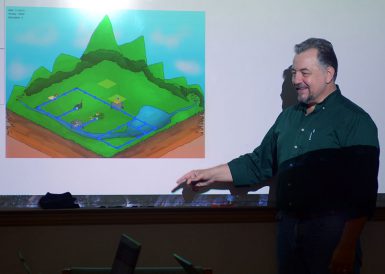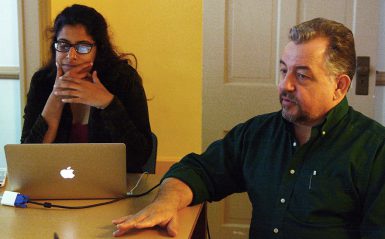Team designing game to teach water usage, management

Have you ever wondered where the water you use to bathe and drink and cook with comes from? Does it come from the lake behind your house, or a neighboring town? How can it always be clean? How do water systems work?
These are just some of the questions professor of practice Mike Sellers and School of Public and Environmental Affairs assistant professor Shahzeen Attari are trying to get people to think about with their interactive game, Waterworks. If people better understand the nature of water as a resource, they may be able to manage their usage better.
“If you’re more aware of this, your behavior will be more likely to change,” said Sellers, who spent 20 years in the game development industry before joining The Media School faculty in 2014. “So that’s what were working on right now. There’s both an experiential part of it, we want you to get on and play the game, and we want you to say yeah, that’s fun.”
With the recent news about drought in California and scarcity of clean water in other areas around the globe, managing this resource is more important than ever to health and to economies.
The developers hope players will have fun as they learn about water usage. Much like games of the past – from The Sims all the way back to The Oregon Trail – users make decisions that affect the outcome of the game.
Sellers said Waterworks has a Sim City vibe to it, but focuses on the water system rather than where to build a house or place the fire department. Each level, or scenario, is different based on the weather and geographical location.
The game starts at the main menu, which has multiple levels, or scenarios, to choose from. Each scenario deals with a different water system dilemma. When the user chooses a level, he or she is responsible for building a water system and caring for the water in that specific situation.

Sellers explained that one scenario is similar to the drought in California. Others deal with residential areas and what needs to be done to clean wastewater coming in from other areas so that town can use the water.
Attari said she has always wanted to create a game that deals with water use in the United States. Much of her research looks at human behaviors and factors that come into play when humans think about the water they use. Two of her students surveyed 500 SPEA students on water use and how a water system looks.
“What our analysis showed was significant and systematic misperceptions on how the entire system works,” Attari said. “One way to correct these misconceptions is to educate people.”
It’s one thing to sit down a group of students and lecture on this topic, hoping to get through to them. It is quite another to create a fun and educational game on the subject, which Attari has been planning to do for a while.
Sellers and Attari connected through an IU public science email list. Sellers sent out an email related to games to the list, and Attari responded by asking to meet with him and talk. When Attari explained her vision of a game based on water systems, Sellers was on board.
“We have the expertise here,” Attari said. “We both understand the water system science and engineering as well as understand we can create a game that’s both educational as well as fun to play.”
The game, which will be offered online, is available to all ages in hopes of educating the public.

The process began in early 2015. Attari is the principal investigator on the project and also oversees the data. Sellers helps the team think in terms of a game rather than displaying research and findings. He explains the technical aspects of how games work and how to structure Waterworks to make it fun. Sellers and Attari are working on questions to ask players that will help them understand water systems.
The two lead a team of four students: Ian Ford, senior majoring in computer science; Shree Harsha, graduate student studying computer science; Carissa Knox, SPEA sophomore; and Allen Townsend, SPEA grad student. All applied to work on this project.
On a recent cold, rainy Tuesday, the team was in high spirits. The first prototype of Waterworks is coming along and will be available by May. Ian Ford, one of the programmers, pulled up the current game on a big screen. He explained what has been changed and what needs to be fixed. For example, when the player finishes a level, the color of that level’s button on the menu page should change.
The team also has pursued funding for the project. In May, Attari and Sellers received a grant from the IU Vincent and Elinor Ostrom Workshop on Political Theory and Political Analysis. The program promotes research that involves students and scholars working to solve real-world problems.

“As our world has become more interactive and inter-connective, our software becomes more interactive, everything we do becomes more interactive,” Sellers said. “And what’s on the very front edge of all of that is games.”

